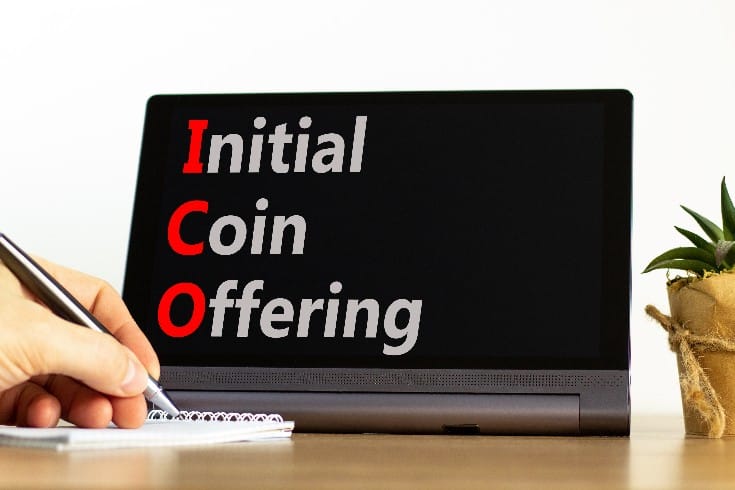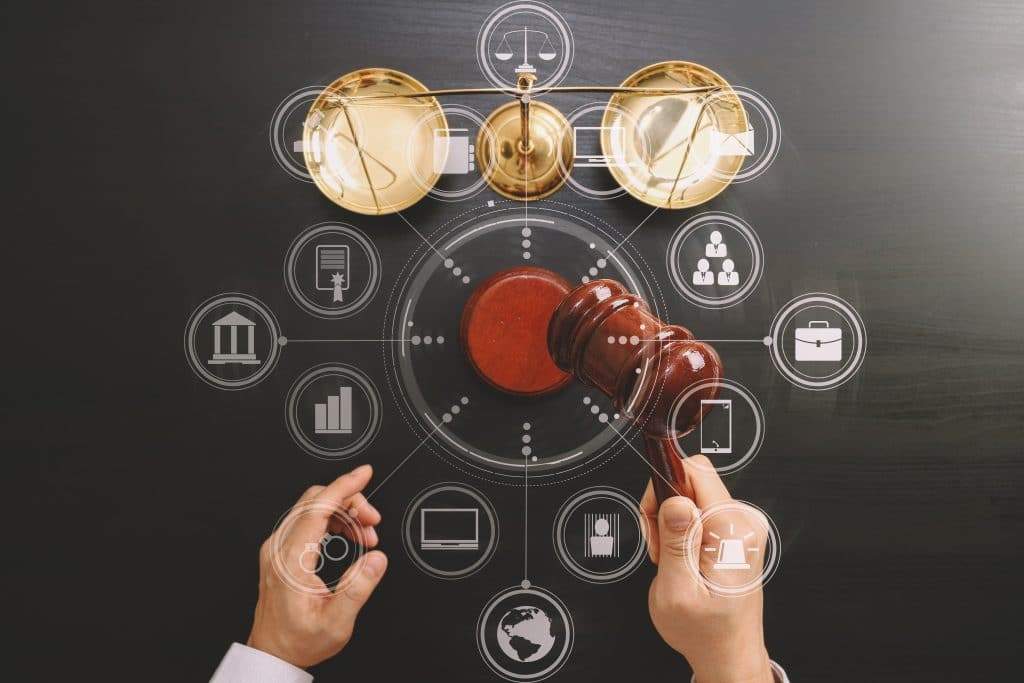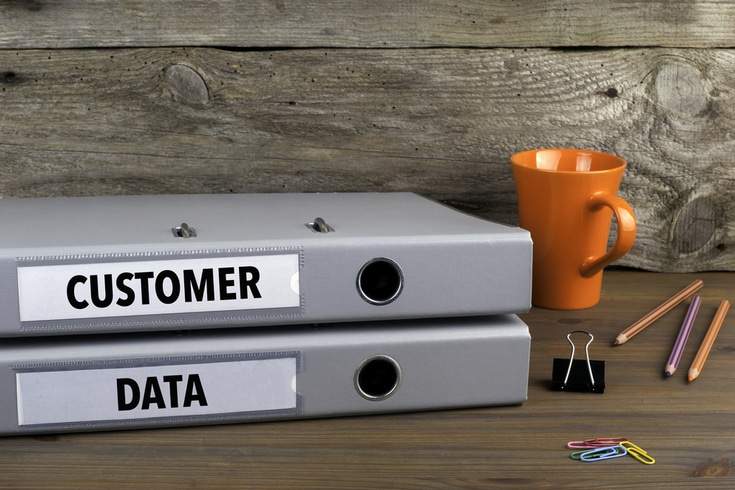What are the Points to Note for Product Labels Claiming Prevention Effects Against the New Coronavirus? Explaining the Japanese 'Act against Unjustifiable Premiums and Misleading Representations
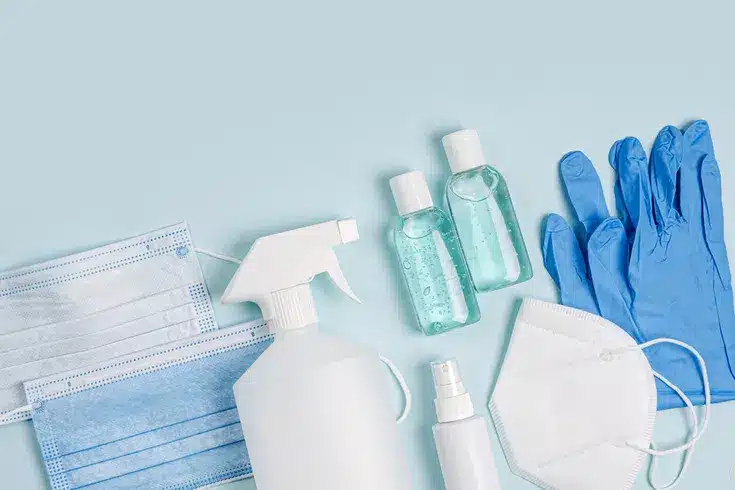
As the COVID-19 pandemic continues, we are seeing an increase in products that claim to prevent the virus. You may have come across health foods, negative ion generators, disinfectant sprays, and space sanitizing products in pharmacies or online. However, depending on the content of the product’s description, it may be subject to improvement orders from the Japanese Consumer Affairs Agency, so caution is necessary.
In this article, we will explain the points to be aware of regarding the display of products that claim to have preventive effects against COVID-19.
Response from the Consumer Affairs Agency
The Consumer Affairs Agency is conducting emergency monitoring of products that claim to have preventive effects against the novel coronavirus, and is issuing improvement requests for displays that are suspected to be in violation of the Act against Unjustifiable Premiums and Misleading Representations (Japanese Act against Unjustifiable Premiums and Misleading Representations) and the Health Promotion Act (Japanese Health Promotion Act).
About Health Foods
In June 2021, the Consumer Affairs Agency announced that it had issued improvement requests and alerts to the general public regarding the proper display of health foods that claim to have preventive effects against the novel coronavirus in internet advertisements, from the perspective of the Act against Unjustifiable Premiums and Misleading Representations (Misleading Display) and the Health Promotion Act (False and Exaggerated Display of Food).
Given that it cannot be said that the preventive effects against infection or severe symptoms of the novel coronavirus have been proven by consuming specific health foods,
It is considered that health foods that claim to have preventive effects against the novel coronavirus lack objectivity and rationality at this stage, and are likely to significantly mislead the general consumer’s product selection, and are highly likely to violate the provisions of the Act against Unjustifiable Premiums and Misleading Representations (Misleading Display) and the Health Promotion Act (False and Exaggerated Display of Food).
The effects displayed included “Prevent Corona with Vitamin D, XX Supplement is recommended!”, “For Corona measures! △△ Tea, a world-renowned research facility has recognized that ‘it works against the novel coronavirus'”, etc. Displays such as “Prevent Corona” and “Effective against the novel coronavirus” are likely to be in violation of the Act against Unjustifiable Premiums and Misleading Representations and the Health Promotion Act.
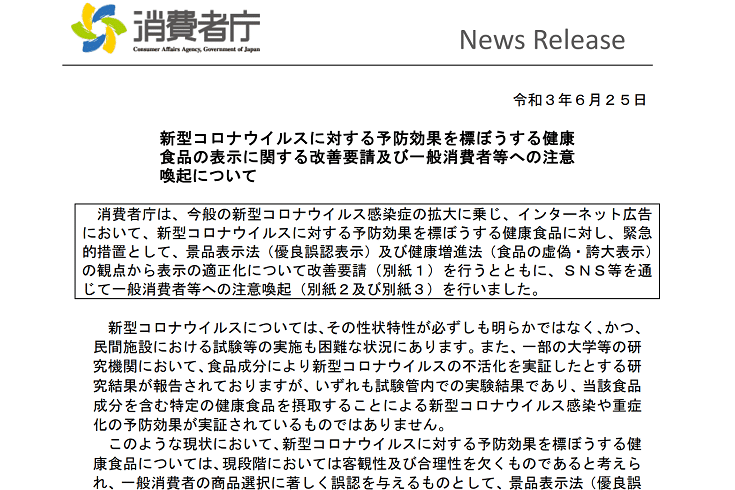
About Health Foods, Negative Ion Generators, Disinfectant Sprays, etc.
In February 2021, not only health foods, but also products such as negative ion generators and disinfectant sprays that claim to prevent the novel coronavirus, were subject to improvement requests and alerts to the general public. Displays such as “Expectations for removal of the novel coronavirus! Virus disinfection rate 99%! Feel the effect! A certain effect can be expected for the removal of the novel coronavirus that is currently wreaking havoc around the world” were subject to improvement requests. It is clear that displays that make consumers believe that there is an effect on the removal of the novel coronavirus, like health foods, are subject to improvement requests.
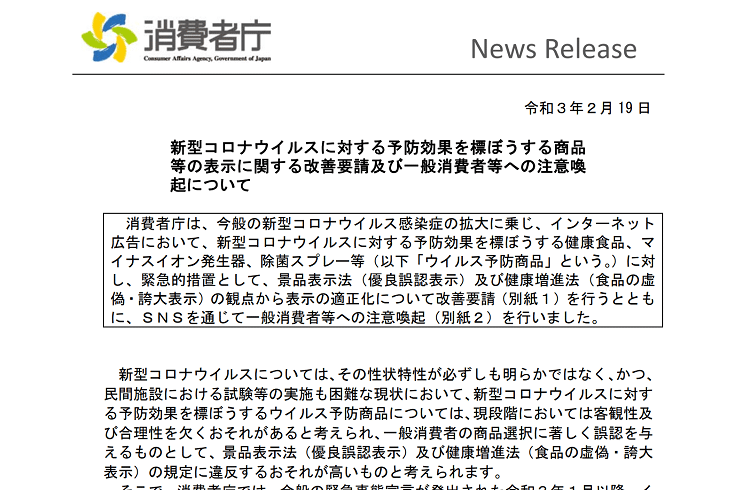
Misleading Superior Quality Claims under the Japanese Premiums and Representations Act
The Japanese Premiums and Representations Act (Act against Unjustifiable Premiums and Misleading Representations) defines three types of misleading representations: misleading superior quality claims, misleading advantageous claims, and other representations that may mislead consumers. In this article, we will focus on misleading superior quality claims.
Examples of Misleading Superior Quality Claims
Misleading superior quality claims refer to:
- Advertising a product or service as being of superior quality than it actually is
- Falsely advertising a product or service as superior, even though it is not particularly superior to products or services sold by competitors
Specific examples include:
- Labeling a product as “Matsusaka beef” even though it is not
- Labeling a necklace made with imitation pearls as “made with natural pearls”
These are examples of misleading superior quality claims. If we apply this to products related to the novel coronavirus, it is difficult to say that any preventive effect against the virus has been proven. Therefore, labeling a product as “Prevents the novel coronavirus!” could likely be considered a misleading superior quality claim.
Measures against Misleading Superior Quality Claims
If a claim is deemed to be a misleading superior quality claim, measures such as orders to cease making similar claims in the future and to take preventive measures against recurrence may be issued.
In addition, a surcharge may be imposed. The surcharge is calculated by applying 3% to the sales amount of the product or service that made the misleading superior quality claim. If the surcharge amount is less than 1.5 million yen, the surcharge will be waived.
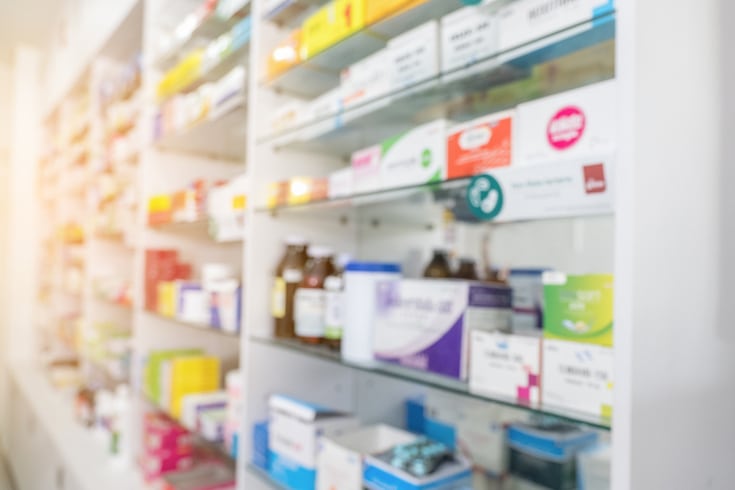
False and Exaggerated Claims of Food Products under the Japanese Health Promotion Act
Advertisements for health foods such as supplements are regulated not only by the Japanese Act against Unjustifiable Premiums and Misleading Representations, but also by the Japanese Health Promotion Act. According to Article 65, Paragraph 1 of the Health Promotion Act, it is prohibited to make claims in food advertisements that:
- Significantly differ from the truth regarding health maintenance and promotion effects
- Significantly mislead people
in relation to health maintenance and promotion effects.
Specific Examples of False and Exaggerated Claims of Food Products
Specifically, claims such as “Just by drinking this, you can cure XX disease” or “Just by eating this, you can lose △ kilos!” without any basis may be considered false and exaggerated. In relation to the novel coronavirus, it is hard to say that there are any foods proven to have virus prevention effects just by drinking or eating them. Therefore, claims such as “Prevent the novel coronavirus just by drinking this” are likely to be considered false and exaggerated.
Measures against False and Exaggerated Claims of Food Products
If exaggerated claims are made about a food product, and it is deemed that this could significantly impact the promotion of national health and the accurate transmission of information to the public, a recommendation may be issued to take necessary measures regarding the claim. If no measures are taken without a valid reason despite the recommendation, an order may be issued. If this order is violated, imprisonment or a fine may be imposed.
For more details on laws related to exaggerated advertising such as the Act against Unjustifiable Premiums and Misleading Representations and the Health Promotion Act, please refer to the following article.
https://monolith.law/corporate/hype-penalties[ja]
Summary
With the spread of the novel coronavirus, the Consumer Affairs Agency (Japanese Consumer Affairs Agency) is intensifying its vigilance through emergency monitoring as products claiming to prevent the virus are being sold. Currently, there are no foods or products that have been proven to prevent the novel coronavirus. Selling products that claim to prevent the novel coronavirus could potentially violate the Act against Unjustifiable Premiums and Misleading Representations (Japanese Act against Unjustifiable Premiums and Misleading Representations) and the Health Promotion Act (Japanese Health Promotion Act). When selling virus-related products, it is necessary to avoid representations that may violate these laws. To avoid receiving improvement requests or similar from the Consumer Affairs Agency, consult with a lawyer who is knowledgeable about advertising regulations and conduct thorough deliberations in advance.
Introduction to Our Firm’s Measures
Monolith Law Office is a legal office with high expertise in both IT, particularly the Internet, and law. Recently, violations of the Japanese Prize Display Law, such as deceptive superior quality, have become a significant issue, and the need for legal checks is increasingly growing. Our firm analyzes the legal risks associated with businesses that have already started or are about to start, based on various legal regulations, and aims to legalize them as much as possible without stopping the business. Details are described in the article below.
Category: General Corporate





